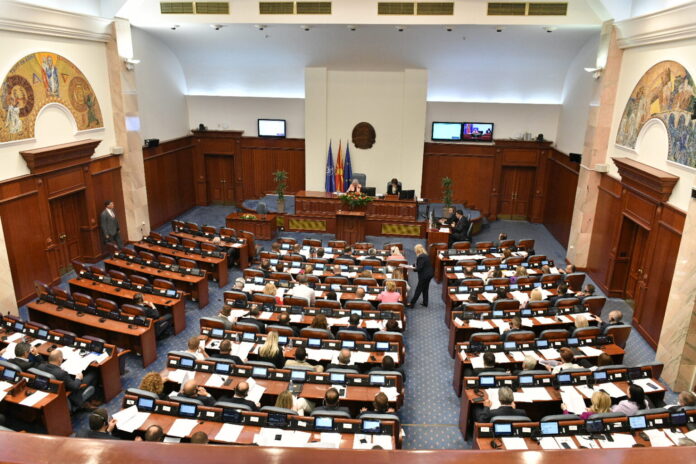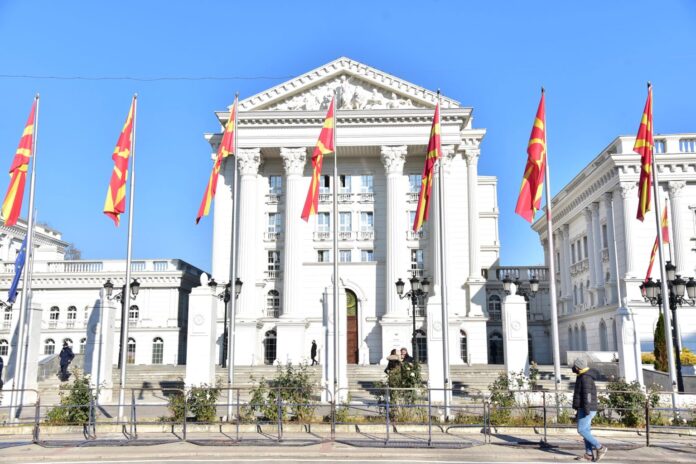Assembly brought fiscal strategy 2026-2030

The Parliament today, within the framework of the 53rd plenary session, adopted the Fiscal Strategy of the Republic of Macedonia for 2026 – 2030 and the amendments to the Law on Urban Planning, and the debate on amendments to the Electoral Code and further votes on amendments to the Law on Primary Education will be voted on.
The Fiscal Strategy was explained by Deputy Finance Minister Nikolce Jankulovski, who said that the document contains the medium -term directions and goals of fiscal policy, basic macroeconomic projections, amounts for the main categories of estimated revenues and expenditures, as well as projections for budget deficits and debt.
Fiscal policy for the period 2026-2030 will be aimed at improving macroeconomic stability and supporting economic activity through gradual fiscal consolidation. A key goal will be to improve public finance management, as well as maintain high levels of capital expenditures that will support long -term economic priorities.
Key elements of fiscal policy in the next medium -term period will be fiscal consolidation and taking measures to ensure fiscal sustainability of the medium -term period, then discipline in managing public funds or fiscal discipline, reducing the gray economy and greater collection of state budget and municipalities. Supporting the economy will imply continuous support for economic growth through investments in infrastructure projects, which will create conditions for business growth and job creation. Redesign the structure of public finances, ie maintaining a high level of capital expenditures to achieve planned economic growth.
One of the elements will be increased transparency and accountability: increased transparency and accountability in public finances, thus enhancing the efficiency of budget expenditures.
In the period 2026 – 2030, tax policy will be aimed at ensuring sustainable economic growth and development, while providing legal security for taxpayers and regular public revenue collection. As stated in the document, the goal is to reduce the gray economy through increased digitization and establish an efficient tax system in order to pay their tax liabilities in every righteous and righteous way. This will allow for the low tax rates to retain other taxes, and at the same time a higher amount of capital investment funds with about 5.2 percent of GDP, tax exemptions, subsidies and incentives of domestic private sector operation and citizens.
The policy of managing public debt will be aimed at providing the necessary funds to finance the budget deficit, to repay debts due to the debt of previous years and for project funding, without causing an unjustified increase in debt to a level that can endanger the economy and economic growth. At the same time, the budget deficit as a percentage share in GDP decreased by 4 percent in 2025 to 3.5 in 2026, 3 in 2027, 3 in 2028, 2.8 in 2029 and 2.8 percent in 2030. At the same time, the primary budget balance has a reduction trend, from 2 % of GDP in 2025 to 1.5 in 2026, 0.9 in 2027, 1 in 2028, 0.7 in 2029 and 0.6 percent in 2030.
SDSM MP Sanja Lukarevska said that the fiscal strategy could predict what the budget rebalance would be. Lukarevska quoting Eurostat said that Macedonia has the lowest minimum wage in Europe, and behind is only Albania, and that it has the lowest standard of purchasing power.
« These are the consequences of VMRO-DPMNE’s rule, which persistently refuses to accept the measures to raise the salaries of SDSM, as well as the prices of foodstuffs, » said Lukarevska, who expressed a number of views on many financial parameters and estimates.
VMRO-DPMNE’s Bojan Stojanovski replied, according to which financial and fiscal consolidation is taking place because there was chaos before, because SDSM lost the elections.
« In 12 months the average net salary has increased by 10, 5 percent, 33,800 pensioners receive pensions increase from 26 to 33 percent, we have record unemployment or record employment – 10,000 people have been given a job for three quarters, » Stojanovski said. He listed foreign direct investment, increased salaries in health and police, building new roads, higher tax collection,…
In the framework of the 53rd plenary session, the amendments to the Electoral Code, for which the general hearing ended and should be voted on. The majority believes that they should be brought in and giving them the space to independent candidates to run in the local elections, while the opposition accuses them of being consulted without being consulted.







